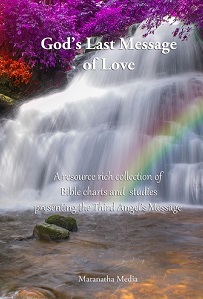Who? "only hath immortality"?
The following are all quotations, no comments are needed.
IMMORTALITY
“Let us have some more plain declarations. In 1 Tim. 6:12 Paul charges Timothy to 'fight the good fight of faith, lay hold on eternal life.' A man cannot 'lay hold' of something that he already has hold of. And how should he 'lay hold' on eternal life? By exercising faith; and this again is in harmony with Christ's words in John 3:16, 36. The apostle then charges Timothy to 'keep this commandment without spot, unrebukable, until the appearing of our Lord Jesus Christ; which in his times he shall show, who is the blessed and only Potentate, the King of kings, and Lord of lords; who only hath immortality, dwelling in the light which no man can approach unto; whom no man hath seen, nor can see.' Verses 13-16. This language must refer to God the Father, for although Christ in Revelation is called 'King of kings and Lord of lords,' it is he in this instance who is going to make known the 'blessed and only Potentate;' and further, the one here spoken of is one 'whom no man hath seen, nor can see;' but Christ has been seen many times.
"But to the main point of the statement. It is that God only hath immortality. So long as the Bible remains, this text will be a standing rebuke to those who claim immortality as theirs by right. That is an attribute of God alone. 'But,' says one, 'is not Christ immortal? and do we not read of the angels that they cannot die?' Yes; and we turn to John 5:26 and read Christ's words: 'For as the Father hath life in himself; so hath he given to the Son to have life in himself.' Christ, then, being the only begotten Son of God, partakes of his attributes, and has life in himself. That is, he is able to impart life to others. The text in Timothy does not shut off any one from obtaining immortality, but if it is obtained it must be as a gift from God. It is in this way that the angels are immortal.” (E.J. WAGGONER, The Present Truth, April 19, 1888, p. 117).
BIBLE WORDS IN THE BIBLE SENSE.
"MAN becomes separated from God by substituting his will for God's will; and the knowledge of what constitutes the will of God is often obscured by the substituting of man's words for God's words, or by a wrong use of God's words. The teaching, "Hold fast the form of sound 'words, "and," If a man speak, let him speak as the oracles of God," involves a rule that cannot be more thoroughly and concisely expressed than by requiring that "all Bible thoughts shall be expressed in Bible words, used in the Bible sense." We unhesitatingly assume it to be true, that to convey to man a knowledge of God's will, the Holy Spirit used exactly the right words in exactly the right sense. With trifling exceptions, all the believers in the God and Christ of the Bible accept the current English version as correctly expressing the revealed will of God.
Notwithstanding this, however, we find the church at large abounding in errors of theory and practice, sustained almost wholly by the unscriptural and unjustifiable custom of speaking of things pertaining to the kingdom of God in other than Bible words, or in the use of Bible words in other than the Bible sense. We instance a few things of the kind, some of which do not impair seriously the doctrine of Christ, but which serve to show how corruptions of any kind may result from the use of unscriptural language. Quite commonly we hear from press and pulpit about " the immortal soul." Neither Jesus nor his apostles have left such a form of words upon record. When immortality is mentioned, it has- reference to the body, first of Christ, "who only hath immortality" —"the firstborn from the dead "—and then of "all them' who are Christ's at his coming." The unscriptural form of words involves an unscriptural idea.” (Bible Echo and Signs of the Times, April 1, 1889, p. 101, presumably by E. J. Waggoner).
CHRIST'S GLORY
"In 1 Timothy 6:16 it is stated of Christ, "Who only hath immortality, dwelling in the light which no man can approach unto; whom no man hath seen, nor can see." What is it that we cannot see.? T. A. Z.
Christ, who since His ascension is at "the right hand of God exalted" (Acts 2:33; Hebrews 10:12), dwells "in the light which no man can approach unto." This is the glory that Christ had with the Father "before the world was." John 17:5. In this glory no sinful man can see Him and live. See Exodus 33:20. When He "humbled Himself" and "was made in the likeness of men" (Philippians 2:8, 7), His glory was veiled in His humanity, and men did see Him. John 1:14.” (Signs of the Times, November 22, 1955, p. 11, presumably by Arthur Maxwell).
“In my continued search for truth I was led to depart from the fallacious doctrine of the natural immortality of man, a doctrine which has fathered the delusion of purgatory and the evils of spiritism, as well as the frightful teaching of eternal torment. Scripture plainly teaches that man is not by nature immortal: he only receives immortality through receiving Christ, ‘who only hath immortality.’” (Signs of the Times, December 1, 1952, p. 7, by George F. Cox).




